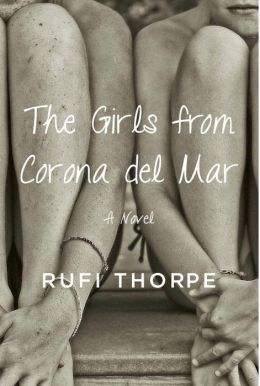 The fiction of marriage and family would fill several libraries, but outside of YA novels, that of "best friends" still occupies a rather small shelf. Rufi Thorpe's debut novel about two lifelong girlfriends is a grown-up look at how difficult but rewarding such a close connection can be. Mia, the adult narrator of The Girls from Corona del Mar, and Lorrie Ann are inseparable adolescent buddies in a middle-class Southern California coastal town, "half-empty, somewhat decayed," before it becomes SoCal with "young women pushing Bugaboo strollers in Lululemon yoga pants, flaunting their post-partum tummy tucks." Mia's mother drinks, her father has run off to San Francisco, and she aborts a pregnancy at age 15 with Lorrie Ann's help. Comparing herself to Lorrie Ann's kindhearted beauty and seemingly solid close family, Mia decides, "I was the bad one... the only one who had routinely shoplifted from Victoria's Secret... and knew all the words to every song by Sublime."
The fiction of marriage and family would fill several libraries, but outside of YA novels, that of "best friends" still occupies a rather small shelf. Rufi Thorpe's debut novel about two lifelong girlfriends is a grown-up look at how difficult but rewarding such a close connection can be. Mia, the adult narrator of The Girls from Corona del Mar, and Lorrie Ann are inseparable adolescent buddies in a middle-class Southern California coastal town, "half-empty, somewhat decayed," before it becomes SoCal with "young women pushing Bugaboo strollers in Lululemon yoga pants, flaunting their post-partum tummy tucks." Mia's mother drinks, her father has run off to San Francisco, and she aborts a pregnancy at age 15 with Lorrie Ann's help. Comparing herself to Lorrie Ann's kindhearted beauty and seemingly solid close family, Mia decides, "I was the bad one... the only one who had routinely shoplifted from Victoria's Secret... and knew all the words to every song by Sublime."
But then life gets in the way of friendship, as it so often does. Lorrie Ann becomes pregnant, marries the simple but stable father and has a difficult childbirth that yields a son stricken with cerebral palsy. Mia wins a scholarship to Yale, finds a satisfying talent for classical languages and falls in love with a fellow scholar with whom she travels to Istanbul to co-translate cuneiform poetry about the Sumerian goddess Inanna. The girlfriends halfheartedly continue to follow each other with occasional Skype calls, but Lorrie Ann's unraveling life is a distant background noise to Mia's happiness--until Lorrie Ann shows up in Istanbul barefoot, emaciated and addicted to heroin. Mia is stunned: "Here was the goddess I had so championed, right there at my kitchen table. And she was a junkie."
Thorpe dives deep into the tangled and sometimes tenuous bonds of friendship, unafraid to address the intermittent jealousy, sarcasm and hurt that often work to weaken the glue holding friends together. The Girls from Corona del Mar also fearlessly addresses the difficult decisions many women face (regarding abortion, marriage, child-rearing, professional success and physical self-abuse) while recognizing that these are often more about fate than choice. Although Mia "still wanted there to be some connection between what we did and what we got," in the end she accepts that making choices is frequently just doing the best one can with what life delivers. It is a testament to the nuance of Thorpe's fine treatment of her characters and their friendship that we come to the same conclusion. --Bruce Jacobs, founding partner, Watermark Books & Cafe, Wichita, Kan.
Shelf Talker: In her debut novel, Rufi Thorpe tackles the intricacies of two women's lifelong friendship and the challenges of holding it together when everything is falling apart.
 "Imagine getting to the end of your days with a lifetime of reading behind you and there being nothing to show for all those experiences save a slab of plastic, the contents of which are only licensed to you and could be cut off on a whim at any moment.... Thankfully, while there's still beauty in the world real books in real bookshops will remain part of our lives."
"Imagine getting to the end of your days with a lifetime of reading behind you and there being nothing to show for all those experiences save a slab of plastic, the contents of which are only licensed to you and could be cut off on a whim at any moment.... Thankfully, while there's still beauty in the world real books in real bookshops will remain part of our lives."









 In a Common Sense column entitled "
In a Common Sense column entitled " As for the Third Place deliveries and promotions, managing partner Robert Sindelar told Stewart in part: "I thought this would show what we as booksellers stand for. While Amazon is blocking people, we literally put the book in their hands. But we're not asking people to boycott Amazon. We're in Seattle and Amazon is a big part of the local economy. We're sensitive to that....
As for the Third Place deliveries and promotions, managing partner Robert Sindelar told Stewart in part: "I thought this would show what we as booksellers stand for. While Amazon is blocking people, we literally put the book in their hands. But we're not asking people to boycott Amazon. We're in Seattle and Amazon is a big part of the local economy. We're sensitive to that....
 An investor group headed by TV pitchwoman Yafit Greenberg, aka Gimel Yafit, has
An investor group headed by TV pitchwoman Yafit Greenberg, aka Gimel Yafit, has 
 Pat Strachan, who had been a senior editor at Little, Brown since 2002 and earlier was fiction editor at the New Yorker for four years, has left the company. She began her career at Farrar, Straus & Giroux, where she worked for 17 years and rose to v-p and associate publisher. She has won the PEN/Roger Klein Award for Editing and Poets & Writers' Editor's Award. She can be reached at
Pat Strachan, who had been a senior editor at Little, Brown since 2002 and earlier was fiction editor at the New Yorker for four years, has left the company. She began her career at Farrar, Straus & Giroux, where she worked for 17 years and rose to v-p and associate publisher. She has won the PEN/Roger Klein Award for Editing and Poets & Writers' Editor's Award. She can be reached at 
 On his blog Sweet with Fall and Fish, Aaron John Curtis, a buyer at Books & Books, Coral Gables, Fla., has posted "
On his blog Sweet with Fall and Fish, Aaron John Curtis, a buyer at Books & Books, Coral Gables, Fla., has posted " "Warning: this video behind last week's engagement picture will bring tears to your eyes and renew your faith in love," cautioned
"Warning: this video behind last week's engagement picture will bring tears to your eyes and renew your faith in love," cautioned  AIA Guide to Chicago, Third Edition
AIA Guide to Chicago, Third Edition The premiere episode of
The premiere episode of  The fiction of marriage and family would fill several libraries, but outside of YA novels, that of "best friends" still occupies a rather small shelf. Rufi Thorpe's debut novel about two lifelong girlfriends is a grown-up look at how difficult but rewarding such a close connection can be. Mia, the adult narrator of The Girls from Corona del Mar, and Lorrie Ann are inseparable adolescent buddies in a middle-class Southern California coastal town, "half-empty, somewhat decayed," before it becomes SoCal with "young women pushing Bugaboo strollers in Lululemon yoga pants, flaunting their post-partum tummy tucks." Mia's mother drinks, her father has run off to San Francisco, and she aborts a pregnancy at age 15 with Lorrie Ann's help. Comparing herself to Lorrie Ann's kindhearted beauty and seemingly solid close family, Mia decides, "I was the bad one... the only one who had routinely shoplifted from Victoria's Secret... and knew all the words to every song by Sublime."
The fiction of marriage and family would fill several libraries, but outside of YA novels, that of "best friends" still occupies a rather small shelf. Rufi Thorpe's debut novel about two lifelong girlfriends is a grown-up look at how difficult but rewarding such a close connection can be. Mia, the adult narrator of The Girls from Corona del Mar, and Lorrie Ann are inseparable adolescent buddies in a middle-class Southern California coastal town, "half-empty, somewhat decayed," before it becomes SoCal with "young women pushing Bugaboo strollers in Lululemon yoga pants, flaunting their post-partum tummy tucks." Mia's mother drinks, her father has run off to San Francisco, and she aborts a pregnancy at age 15 with Lorrie Ann's help. Comparing herself to Lorrie Ann's kindhearted beauty and seemingly solid close family, Mia decides, "I was the bad one... the only one who had routinely shoplifted from Victoria's Secret... and knew all the words to every song by Sublime."